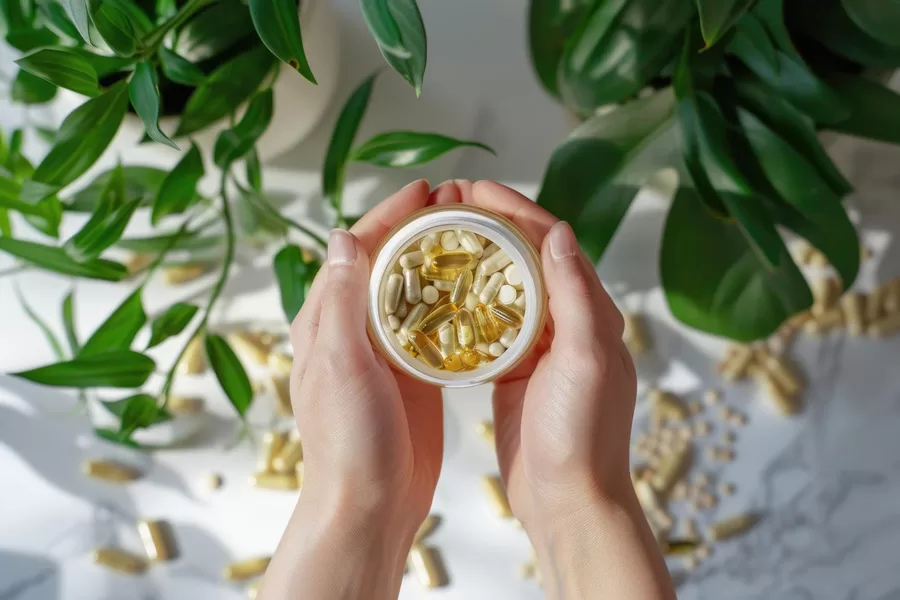
Have you ever considered that the secret to a healthier life might be hiding in the vibrant colors on your dinner plate?Picture the rich greens of leafy vegetables and the warm, inviting yellows of egg yolks. These aren’t just culinary delights; they’re sources of lutein, a powerhouse nutrient with the extraordinary ability to shield your eyes and sharpen your mind. This nutrient doesn’t just brighten our meals—it brightens our health, combating oxidative stress and fostering cognitive clarity.
Lutein
Lutein, a vibrant component found in our daily diet, stands out as a natural pigment known as a carotenoid. This essential nutrient paints our fruits and vegetables in beautiful hues, from the deep greens of leafy vegetables to the sunny yellows of egg yolks. It’s a testament to nature’s palette and its significant role in our nutritional health.
The Source of Lutein’s Colors
Where does lutein’s color shine the brightest? In the healthy greens of spinach, kale, and broccoli, and the rich yellows of egg yolks and creamy texture of avocados. These foods are not just a feast for the eyes but a bounty of lutein, serving as a cornerstone for our well-being. Lutein’s job goes beyond adding color; it acts as a guardian against oxidative stress, safeguarding our cells from the invisible threats of free radicals.
Beyond the Eye
It’s a fascinating fact: our bodies, for all their complexity, cannot muster the ability to produce lutein. This places the responsibility on us to ensure our diet is rich in this crucial nutrient. Its renowned benefits for eye health—shielding our vision like natural sunglasses from harsh light—are matched by its emerging role in cognitive vitality, keeping our thoughts clear and memory sharp.
A Diet Rich in Lutein
Ensuring a sufficient intake of lutein means turning to the sources nature provides. While leafy greens might top the list, there’s room for variety with eggs and avocados. Incorporating these lutein-rich foods into our meals is not merely a step towards a more colorful plate but a leap towards optimal health, supporting our bodies in more ways than one.
Lutein’s Role in Cognitive Function
Shielding the Brain with Antioxidant and Anti-inflammatory Powers
Lutein acts like a shield for our brain. Lutein jumps into action, neutralizing these enemies with its antioxidant powers, which helps keep our brain cells safe and sound. But that’s not all. Lutein also calms down inflammation in the brain, which can be harmful if it gets out of control. By keeping inflammation in check, lutein helps protect our brain from damage and keeps it healthy and functioning well.
Boosting Brain Signals with Neural Efficiency
Our brain works by sending signals from one cell to another. For our brain to work smoothly, these signals need to be strong and clear. Research has found that lutein helps with this, too. It builds up in the brain, especially in areas important for memory and learning, and works like a signal booster, making sure messages are sent clearly and efficiently. This helps us think more clearly, learn new things more easily, and remember more effectively.
Fighting Age-Related Cognitive Decline
As we get older, it’s natural for our brain to slow down a bit. However, studies have shown that lutein can help slow down this slowing down. People with higher levels of lutein tend to keep their brain power sharper for longer. This means they’re better at remembering things, solving problems, and thinking quickly even as they age. In other words, lutein can help our brains stay young and agile, protecting us against the natural decline that comes with getting older.
Lutein is incredibly important for keeping our brain healthy. It fights off damage from free radicals, reduces harmful inflammation, helps our brain cells communicate more effectively, and even helps protect our cognitive abilities as we age. So, eating foods rich in lutein isn’t just good for our eyes—it’s also essential for maintaining a sharp, healthy brain. By including more lutein-rich foods in our diets, like leafy greens, eggs, and avocados, we’re not just eating for today; we’re investing in our brain’s health for the future.
Incorporating Lutein into Your Diet
- Leafy Greens: When it comes to lutein, leafy greens are true champions. Spinach, kale, and other dark, leafy vegetables are packed with this vital nutrient. Just a small serving of these greens can provide a significant portion of the lutein we need each day. You can make salads, add them to smoothies, or cook them as a side dish. Eating a variety of these vegetables ensures we get plenty of lutein and makes our meals more interesting and flavorful.
- Eggs: Eggs, especially the yolks, are another fantastic source of lutein. What’s great about eggs is their versatility. You can enjoy them boiled, scrambled, or as part of other dishes. Plus, when eggs are cooked, the lutein becomes even easier for our body to use. This makes eggs not just a convenient source of lutein but also an efficient one. Incorporating eggs into your diet is as simple as having them for breakfast or as a snack.
- Avocados: Avocados are a tasty way to get your lutein. They’re not only rich in this essential nutrient but also in healthy fats that are good for our heart and brain. Avocados can be added to salads, made into guacamole, or simply enjoyed on toast. Their creamy texture and rich flavor make them a popular choice for people looking to boost their lutein intake while also getting other important nutrients.
- Other Vegetables: Peas, corn, and orange bell peppers add more color and lutein to our plates. These vegetables are versatile and can be included in a variety of dishes, from stir-fries to soups. Each offers a unique taste and texture, making it easy to keep meals interesting and lutein-rich. By including a range of vegetables in our diet, we not only get lutein but also a host of other vitamins and minerals essential for our health.
Incorporating lutein into your diet is an important step towards maintaining a healthy brain and sharp vision. With so many delicious sources of lutein, from leafy greens to avocados, it’s easy to include this nutrient in your daily meals. By diversifying your diet with these lutein-rich foods, you’re not just enjoying tasty meals; you’re also taking care of your cognitive and visual health. Remember, a little variety can go a long way in providing your body with the nutrients it needs to thrive.
Recommended Daily Intake
Finding the right amount of certain key nutrients to support eye and brain health can seem like navigating a maze without a clear guide. While specific guidelines for daily intake vary, nutrition experts often point to a beneficial range for these essential carotenoids, generally between 6 to 10 milligrams.
The Challenge of Setting a Universal Standard
One size doesn’t fit all when it comes to nutritional advice. Individual factors such as age, overall health, and lifestyle play significant roles in determining the optimal amount of this nutrient for each person. Ongoing research continues to unveil the diverse benefits of carotenoids, suggesting that intake recommendations may evolve with new discoveries.
Diverse Sources for Your Diet
Leafy vegetables like spinach and kale, alongside eggs and avocados, are treasure troves of these eye and brain-boosting carotenoids. A single cup of cooked greens can offer more than double the amount suggested for daily intake, making it easy to surpass the minimum beneficial amount.
For those who find greens less palatable, diversifying your plate with a variety of sources can ensure you still meet your nutritional goals. Balance and variety are key, emphasizing the importance of a diet rich in colorful produce.
Optimizing Absorption
Since these nutrients are fat-soluble, pairing them with a bit of healthy fat can significantly enhance their uptake by the body. A splash of olive oil on your salad or incorporating fats through nuts or avocados can make a real difference in how well your body can utilize these nutrients.
Supplementing Wisely
For individuals unable to meet their needs through food alone, supplements may offer a viable alternative. However, consulting with a healthcare professional is crucial to ensure they fit safely into your health regimen, particularly for those on medication or with specific health concerns.
In sum, while the exact numbers may not be set in stone, aiming for a dietary intake that includes a wide array of colorful fruits and vegetables can help safeguard your vision and cognitive functions. As the scientific community learns more, we’ll likely gain clearer insights into how best to harness the power of these vital nutrients.
Maximizing Nutrient Retention in Cooking
Creating meals that hold onto the essential goodness of vitamins and minerals doesn’t require culinary magic. The secret lies in how we prepare our dishes, especially those rich in vital carotenoids.
- Opt for Mild Cooking Techniques: Not all cooking methods are created equal when it comes to preserving nutrients. Techniques such as steaming and blanching are gentle heroes, ensuring the vibrant components of our veggies stay put. Steaming, as opposed to boiling, means nutrients stay within the food, not in the water. So, for nutrient-packed greens, let steaming be your go-to.
- Introduce Healthy Fats: Combining veggies with a touch of healthy fats can significantly boost nutrient absorption. These vitamins are fat-soluble, making them more readily absorbed when eaten with fats. Sprinkling olive oil on your veggies or using a little avocado oil for cooking can make a big difference in how well your body takes in these nutrients.
- Keep Cooking Times Short: Limiting how long you cook your veggies can help preserve their nutrient content. Techniques like quick stir-frying or light steaming can soften your veggies while maintaining their beneficial properties. Aim to reduce cooking times to ensure these essentials don’t dissipate with the heat.
- Leverage the Cooking Liquid: When boiling is part of your cooking, think about using the leftover water in broths, soups, or sauces. This way, any nutrients that seeped into the water aren’t wasted but are instead consumed in a different, delicious form.
- Incorporate Raw Elements: Adding uncooked foods to your diet is a foolproof method to capture nutrients in their most potent form. Raw salads, smoothies, and fresh sips are perfect for enjoying the full spectrum of vitamins and minerals without the risk of heat degradation. A mix of raw and gently cooked fare in your meals ensures a nutrient-rich diet.
With thoughtful preparation and cooking, your meals can be both delectable and nutrient-dense. Remember, the aim is to relish a diverse array of dishes in ways that most benefit your health, keeping them both flavorful and rich in essential vitamins and minerals.
Conclusion
Discover lutein’s pivotal role: A naturally occurring carotenoid in vibrant veggies and yolks, vital for ocular and mental acuity. Combat oxidative harm and boost cognitive prowess with lutein-rich nourishment, fostering sharper memory and learning capabilities. Diverse dietary inclusions like leafy greens, eggs, and avocados are key to leveraging lutein’s health-enhancing properties. Aiming for a daily lutein intake of 6 to 10 milligrams through strategic food choices supports overall wellness and brain health. Adopt nutrient-preserving cooking habits, such as gentle steaming and incorporating fats, to fully benefit from lutein’s potential.
FAQs
As a vibrant carotenoid, lutein is integral to eye and brain health, found in colorful veggies and yolks. It plays a key role in shielding against cell damage and enhancing mental sharpness.
Lutein filters out damaging blue light and minimizes the risk of eye diseases, acting as a natural protective layer for your vision.
Absolutely. Lutein is known to accumulate in brain tissue, improving cognitive functions by bolstering neuron efficiency, which aids in better memory and learning outcomes.
For a lutein boost, turn to dark leafy vegetables like spinach and kale, as well as egg yolks and avocados. These foods are packed with lutein and can help you reach your nutritional goals.
Though individual needs may vary, incorporating 6 to 10 milligrams of lutein into your daily diet is suggested for maintaining optimal eye and brain health.
Enhance lutein uptake by pairing it with healthy fats, such as those found in olive oil or nuts, and opt for cooking methods that retain its value, like steaming or sautéing lightly.







